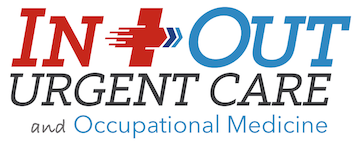Proper hydration plays a crucial role in maintaining overall health and wellness. Adequate fluid levels support vital bodily functions such as temperature regulation, digestion, and waste elimination. However, when water and electrolyte intake don’t match the body’s needs, dehydration can occur, posing significant health risks and necessitating prompt medical attention.
In & Out Urgent Care, with locations in New Orleans and North Shore, offers personable, affordable, and convenient care for patients experiencing non-life-threatening dehydration, ensuring that they receive the appropriate treatment for a speedy recovery.
In this blog, we will explore the importance of staying hydrated, discuss the consequences of dehydration, share practical tips for maintaining optimum fluid levels, and highlight how In & Out Urgent Care can help treat dehydration effectively. Our goal is to empower readers with the knowledge and resources to maintain proper hydration and understand when seeking professional help for dehydration is necessary.
The Essential Role of Hydration for Optimal Health
Staying hydrated is critical to maintaining a healthy lifestyle, as water plays a vital role in the body’s various functions:
- Temperature Regulation: Water helps regulate body temperature by dissipating heat through sweating.
- Nutrient Transport: Efficient circulation and nutrient transport throughout the body depend on water, which is the primary component of blood.
- Waste Elimination: Proper hydration enables efficient waste elimination in the form of urine and sweat, reducing the risk of kidney stones and urinary tract infections.
- Digestion: Adequate fluid levels promote healthy digestion by maintaining proper saliva production and preventing constipation.
These essential roles underline the importance of paying close attention to hydration and being proactive about daily water intake.
Identifying the Signs of Dehydration
Recognizing the symptoms of dehydration is crucial for seeking timely medical intervention. Some common signs of dehydration include:
- Thirst: This is often the first indicator of dehydration, serving as a signal that your body needs more water.
- Darker Urine: As dehydration progresses, urine may become darker in color, indicating a higher concentration of waste products.
- Fatigue and Dizziness: Dehydration can cause feelings of lethargy and lightheadedness due to reduced blood volume and electrolyte imbalances.
- Dry Mouth and Skin: Insufficient fluid levels cause reduced saliva production and decreased skin turgor, resulting in dry mouth and skin.
- Headache: Dehydration can trigger headaches due to decreased blood flow to the brain or electrolyte imbalances.
If any of these symptoms persist or worsen, it is essential to seek prompt medical attention at In & Out Urgent Care.
Practical Tips for Maintaining Optimal Hydration
Ensuring proper hydration begins with adopting healthy habits that promote adequate fluid intake:
- Set Daily Water Goals: Generally, it is recommended to consume at least half your body weight in ounces of water per day. Monitoring intake can help ensure you reach these daily goals.
- Incorporate Water-Rich Foods: Incorporating fruits and vegetables with high water content, such as watermelon, cucumbers, and oranges, can contribute to fluid intake.
- Use Reusable Water Bottles: Carrying a reusable water bottle ensures you always have access to water and can monitor your intake throughout the day.
- Replace Sugary Drinks with Water: Choose water over beverages high in sugar and calories. For a flavor boost, add fruit slices or a splash of lemon juice.
- Adjust for Physical Activity: Intense exercise or high temperatures require increased fluid intake to replace lost fluids through sweating.
By incorporating these practical tips into your daily routine, you can maintain optimal hydration levels and reduce the risk of dehydration.
In & Out Urgent Care’s Role in Dehydration Treatment and Prevention
In & Out Urgent Care offers a range of services to address dehydration and associated complications effectively:
- Thorough Assessment and Diagnosis: Healthcare providers at In & Out Urgent Care perform a comprehensive evaluation to diagnose dehydration accurately, taking into account symptoms, medical history, and the severity of the condition.
- Rehydration Therapy: In moderate to severe cases, intravenous (IV) fluids may be administered to replenish lost fluids and electrolytes rapidly.
- Symptom Management: Healthcare providers at In & Out Urgent Care can recommend over-the-counter or prescription medications to alleviate symptoms associated with dehydration, such as headache, nausea, or muscle cramps.
- Patient Education: In & Out Urgent Care offers education on hydration requirements, appropriate fluid intake, and preventive measures to help patients maintain healthy hydration levels and avoid future dehydration episodes.
In & Out Urgent Care’s commitment to providing accessible, affordable, and personable care ensures superior patient outcomes and a supportive environment for all non-life-threatening medical concerns, including dehydration treatment.
Final Thoughts
Staying hydrated is paramount for maintaining overall health and well-being. Understanding the importance of hydration, recognizing the signs of dehydration, and employing practical strategies to maintain optimal fluid levels are essential for proactively managing this aspect of your health.
In instances where medical intervention becomes necessary due to dehydration symptoms, In & Out Urgent Care in New Orleans and North Shore is equipped to deliver timely, effective care. Trust our dedicated team of healthcare professionals at our urgent care in New Orleans, LA, to support and guide you in maintaining proper hydration and enjoying a healthy and active lifestyle.

